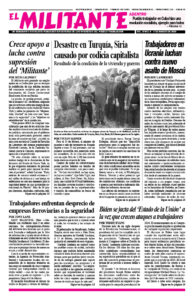The Militant is winning broad support in its fight to overturn the ban on a recent issue of the socialist newsweekly by Blackwater River Correctional Facility officials in Florida.
The privately run prison banned issue no. 4 on Feb. 1, claiming articles on a strike by thousands of New York City nurses and on the “Women, life, freedom” protests in Iran were a “threat to the security” and the “rehabilitative objectives” of the facility.
“This seems hard to imagine considering that one of the cited articles discusses how the Iranian government’s sanctioned murder of political dissidents is sparking anti-death-penalty protests in Iran,” Elizabeth Larison, director of the arts and culture advocacy program of the National Coalition Against Censorship, wrote in a letter opposing the ban sent to the prison system’s Literature Review Committee.
“The other article covers the recent successful strike of the New York State Nurses Association, in which they demanded staffing increases in part to improve patient care,” she noted. “These news stories of extreme state censorship 7,000 miles away and a nursing strike are hardly a security threat within a Florida Correctional facility.” More than 50 literary, trade union, cultural, religious and other groups belong to the coalition.
At the same time, two other Florida prisons — Wakulla Correctional Institution and Charlotte Correctional Institution — have been withholding the paper from inmate subscribers without any written notification to the prisoner or the Militant, in violation of the prison system’s rules and regulations.
“Prisons cannot ban a publication without notice or reason,” the Reporters Committee for Freedom of the Press, said in its letter to Florida prison officials. “The impoundment and confiscation of the Militant infringes upon the First Amendment rights of both the Militant’s publisher and its incarcerated subscribers.” The reporters committee is led by journalists from some of the largest news media in the U.S.
PEN America, an organization of more than 7,000 novelists, writers, editors, publishers and others who defend freedom of expression, also called for overturning the ban. The articles on the New York nurses and protests for equal rights in Iran “have no bearing on the security or order of the facility,” PEN America spokesperson Moira Marquis wrote.
Starting in 2013 Florida prison officials have tried to suppress the Militant nearly 50 times. The Militant challenged every one and with broad support has overturned the majority of them. And for the last two years the Militant hadn’t received notice of any bans there until this one.
A victory for the Militant will also help in overturning the suppression of books and other publications in Florida and nationwide. The Marshall Project released a report in December 2022 showing Florida officials have banned 20,000 books, the highest number of any prison system in the country. Texas is close behind, and the two prison systems account for about half of the 54,000 books banned by prison officials in the 18 states the report covers.
One of those books was Corrections in Ink by Keri Blakinger, which recounts her experiences during nearly two years in prison a decade ago. Florida prison officials banned the book in September alleging that it is “dangerously inflammatory in that it advocates or encourages” unrest.
The Literature Review Committee upheld the ban at that time, based on two short sections in the book. One reports how an inmate invented an imaginary pet chicken in an attempt to get authorities to decide she was mentally ill. The other describes how a jailer tormented one woman by a “joke search” of her cell, destroying her property.
Blakinger, with the help of the American Civil Liberties Union, won a victory earlier this month when the Literature Review Committee reversed itself and lifted the ban. “It’s beyond charitable to call the prison and FDOC’s original position as ridiculous,” ACLU attorney Corene Kendrick told the press.
Ban violates the Constitution
“Blackwater River’s ban has nothing to do with ‘security’ or the prison authorities’ alleged concern with ‘rehabilitating’ prisoners,” Militant editor John Studer said Feb. 17. “Nurses strikes across the country and the protests in Iran have been covered by virtually every media nationwide. This ban shows that the prison authorities’ real target is the political perspective of the Militant. This is unconstitutional.
“The New York nurses and the protesters in Iran are showing the power of solidarity, of uniting working people whatever their religion, language or skin color,” Studer said. “The Militant views those behind bars as fellow workers who are part of the world, who need access to a variety of viewpoints to think for themselves, consider different ideas, have their own opinions.
“Join us in pushing back this blatant attempt to violate the right to free speech and freedom of the press,” Studer said. “This is an especially good opportunity to bring this issue to nurses and other unions and ask them to back the Militant’s fight.”
Reach out to your union officials, co-workers, church groups, to nurses and other health care workers’ unions.
Send letters to Saritza.Legault@fdc.myflorida.com and Melvin.Herring@fdc.myflorida.com or via post office mail to Florida DC Literature Review Committee, 501 South Calhoun Street, Tallahassee, FL 32399-2500.
Please send a copy to the Militant.

